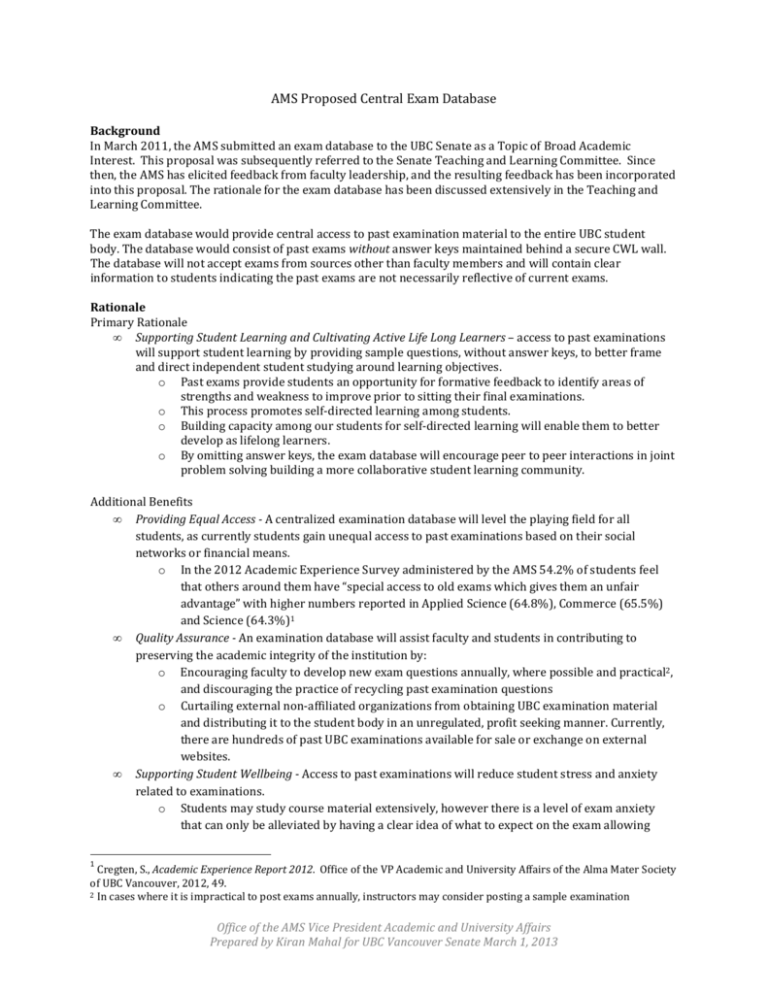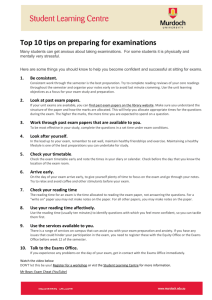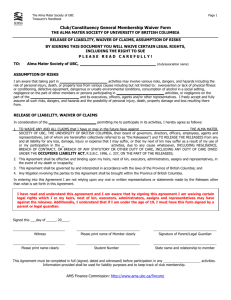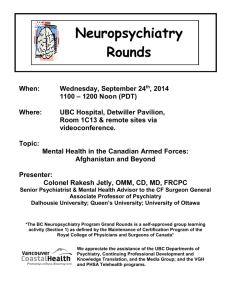Exam Database Senate - March 1 2013
advertisement

AMS Proposed Central Exam Database Background In March 2011, the AMS submitted an exam database to the UBC Senate as a Topic of Broad Academic Interest. This proposal was subsequently referred to the Senate Teaching and Learning Committee. Since then, the AMS has elicited feedback from faculty leadership, and the resulting feedback has been incorporated into this proposal. The rationale for the exam database has been discussed extensively in the Teaching and Learning Committee. The exam database would provide central access to past examination material to the entire UBC student body. The database would consist of past exams without answer keys maintained behind a secure CWL wall. The database will not accept exams from sources other than faculty members and will contain clear information to students indicating the past exams are not necessarily reflective of current exams. Rationale Primary Rationale • Supporting Student Learning and Cultivating Active Life Long Learners – access to past examinations will support student learning by providing sample questions, without answer keys, to better frame and direct independent student studying around learning objectives. o Past exams provide students an opportunity for formative feedback to identify areas of strengths and weakness to improve prior to sitting their final examinations. o This process promotes self-directed learning among students. o Building capacity among our students for self-directed learning will enable them to better develop as lifelong learners. o By omitting answer keys, the exam database will encourage peer to peer interactions in joint problem solving building a more collaborative student learning community. Additional Benefits • Providing Equal Access - A centralized examination database will level the playing field for all students, as currently students gain unequal access to past examinations based on their social networks or financial means. o In the 2012 Academic Experience Survey administered by the AMS 54.2% of students feel that others around them have “special access to old exams which gives them an unfair advantage” with higher numbers reported in Applied Science (64.8%), Commerce (65.5%) and Science (64.3%)1 • Quality Assurance - An examination database will assist faculty and students in contributing to preserving the academic integrity of the institution by: o Encouraging faculty to develop new exam questions annually, where possible and practical2, and discouraging the practice of recycling past examination questions o Curtailing external non-affiliated organizations from obtaining UBC examination material and distributing it to the student body in an unregulated, profit seeking manner. Currently, there are hundreds of past UBC examinations available for sale or exchange on external websites. • Supporting Student Wellbeing - Access to past examinations will reduce student stress and anxiety related to examinations. o Students may study course material extensively, however there is a level of exam anxiety that can only be alleviated by having a clear idea of what to expect on the exam allowing 1 Cregten, S., Academic Experience Report 2012. Office of the VP Academic and University Affairs of the Alma Mater Society of UBC Vancouver, 2012, 49. 2 In cases where it is impractical to post exams annually, instructors may consider posting a sample examination Office of the AMS Vice President Academic and University Affairs Prepared by Kiran Mahal for UBC Vancouver Senate March 1, 2013 o o them, as outlined above, to utilize the past exams as formative feedback to identify areas of improvement. In the 2012 Academic Experience Survey administered by the AMS, 70.9% of all respondents supported the statement that “access to old exams in [my] 1st and 2nd year would have decreased [my] stress or anxiety level surrounding exams” with numbers as high as 78.3% in Applied Science, 81.7% in Commerce, 81.2% in Science and 77.7% in Land and Food Systems. This point is even more significant when framed with the National College Health Assessment Data which shows that that 54% of undergraduate students cited academics as being an issue that they considered traumatic or difficult to handle in the last 12 months, compared to 43% in the US based reference group3. 61% of female domestic students and 55% of male domestic students cited their overall level of stress in the last 12 months as “more than average” or “tremendous”4. Strategic Significance UBC’s Strategic Plan, Place and Promise makes a strong commitment to enhancing Student Learning. The concept of an examination database aligns with a number of goals within the commitment to Student Learning5: • “Strengthen efforts to promote student success” o “Develop and implement initiatives that support student engagement and achievement” • “Support student well-being, personal development and outstanding campus life” o “Support student-led initiatives to create a campus culture of involvement” o “Increase support for student health and wellbeing, with a specific focus on mental health” Target While this resource will be open to all faculty members who wish to participate, initially the exam database will target 100 and 200 level courses for participation with the aim to assist junior students in integrating into university academics. In the recent Academic Experience Survey conducted by the AMS, 70.9% of respondents supported the statement that access to past exams in their first and second year would have reduced their level of stress and anxiety associated with exams.6 The exam database will be a resource for direct entry undergraduate programs only. UBC Policy Under UBC Policy 88, examinations are classified as “literary works” for which the intellectual property rights lie with the individual faculty member who created the examination in question. AMS Plans for Development and Implementation Ideally, students would like all past exams to be readily available online. However we understand that given the parameters set out by Policy 88, this is not possible. Senate or Faculties cannot compel individual faculty members to make their past exams available. While we are not able to influence this policy at this time, the AMS still feels the creation of an exam database is crucial for students and will be pursuing the project. The database will be developed by the UBC Web Development Team with the capability to be linked to the current Learning Management System UBC Connect for secure hosting behind a CWL wall. To assist with the development and implementation, a steering committee will be struck by the AMS to be comprised of key individuals from the VP Students Office, Centre for Teaching and Learning Technology, the Provosts Office, Mirwaldt, P., Washburn, C., Health of University of British Columbia Students Presentation, April 30, 2012. Ibid 5 http://strategicplan.ubc.ca/the-plan/student-learning/ 6 Cregten, S., Academic Experience Report 2012. Office of the VP Academic and University Affairs of the Alma Mater Society of UBC Vancouver, 2012, 48. 3 4 Office of the AMS Vice President Academic and University Affairs Prepared by Kiran Mahal for UBC Vancouver Senate March 1, 2013 faculty members in Education specializing in assessment, and student representatives. The project will be funded by the AMS with support from the Vice President Students Office. The mandate of this committee will be to provide advice and guidance on the development of the project and to assist in designing metrics for success and evaluation. The hope is that the first year of implementation can be viewed as a pilot phase, open to any faculty members who wish to participate. This phase can be used to help inform future decisions regarding access to past examinations for UBC students. Outstanding Canadian Example: Queen’s University Faculty of Arts and Science explains the process and rationale for the ExamBank in its Confidential Exam Guidelines for Instructors, noting that “the goal was to ensure that all students had equal access to final exams administered in earlier versions of their courses … the release of exam question papers also encourages good practice in terms of academic integrity by encouraging instructors to construct new exam questions in subsequent offerings of the same course. While exams should normally be released to the Exambank, exceptions to the Senate policy may be granted under rare and occasional circumstances. Exams designated as “confidential” will never be released to the Exambank.”7 2012 National Survey of Student Engagement benchmark results8 showed that Queen’s University ranked higher, and closer to the NSSE 2012 average, than UBC on categories including fostering a supportive campus environment. • Supportive Campus Environment – “this benchmark measures the extent to which each university supports academic and non-academic endeavors, and cultivates positive relationships among students, faculty and staff” o NSSE Average – 63 / 60.2 o Queen’s – 62.8 / 59.2 o UBC Vancouver – 54.2 / 49.7 7 8 Queen’s University Faculty of Arts and Science. Confidential Exam Guidelines for Instructors. Sept. 8 2011. http://oncampus.macleans.ca/education/2013/02/07/how-well-do-canadian-universities-follow-best-practices/ Office of the AMS Vice President Academic and University Affairs Prepared by Kiran Mahal for UBC Vancouver Senate March 1, 2013





